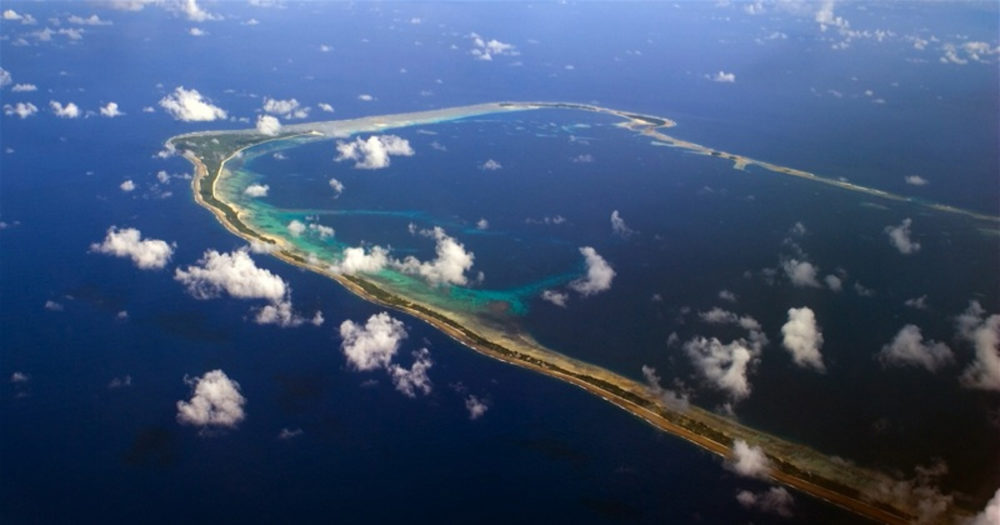This week, Interior Secretary Ryan Zinke heads the United States delegation to the Pacific Islands Forum Leader’s Session on the Island of Nauru on September 4, 2018, an annual gathering of dozens of Pacific Island leaders and partners. In the Interior Department press release, Zinke noted that the Pacific Islands are strategically important and he wants to discuss trade and the rule of law. He did not indicate any interest in discussing the impacts of climate change in the Pacific Islands region – dramatic impacts that his own agency described in a publication earlier this year.
The US Geological Survey (USGS), the lead science agency within the US Department of the Interior, published a report in April with an ominous headline: “Many Low-Lying Atoll Islands Will Be Uninhabitable by Mid-21st Century.” The study concluded that due to rising sea levels, flooding, and salt-water intrusion into aquifers there will be no potable water on thousands of islands in the Pacific “no later than the middle of the 21st century,” rendering those islands uninhabitable. Thirty to forty years from today, entire island cultures may have to leave their homelands for good because we have burned too much fossil fuel.
In the meantime, they urgently need assistance to adapt to rising seas, build resilience, and develop the infrastructure that could save lives and livelihoods before and during relocation. Ironically, the Interior Department, the agency that released this study, stands in the way of the assistance these islands so desperately need.
The USGS study, a collaboration with the National Oceanic and Atmospheric Administration, the University of Hawaii, and other partners, was funded by the Department of Defense, an agency that has become increasingly concerned about the impacts of climate change upon national security. The research took place on an atoll in the Republic of the Marshall Islands, a country that was tragically irradiated by American nuclear weapons testing in the 1940s and 50s. A series of international agreements since those years have attempted to provide adequate restitution for the people of the Marshall Islands, with little success. The current agreement is a “Compact of Free Association” that was enacted into law by Congress in 1986 and has been periodically updated.
Under this Compact, the United States agreed to provide the Marshall Islands with security and defense as well as financial assistance. The Interior Department is the agency charged with overseeing the grant assistance and aid to meet a variety of needs, including health, education, infrastructure, and disaster preparedness.
This recent study from the Interior Department has dramatically raised the stakes for those badly-needed resources, particularly for addressing resilience and disaster preparedness. Until now, the Marshallese thought they had until the end of this century before their homeland could be uninhabitable. This report shows that they may have far less time to adapt, and they urgently need the American assistance that has been promised.
Unfortunately, Secretary Ryan Zinke’s agency has eliminated all climate change language from Interior’s strategic plan, censored press releases and deleted references to climate change on agency websites, promoted amateurish climate denial literature, and advanced an aggressive fossil fuel agenda despite its role in accelerating climate change. To make matters worse, the Assistant Secretary for Insular Affairs, the person responsible for overseeing the Interior Department’s assistance to the Marshall Islands, is a protégé of Charles and David Koch, the oil billionaires best known for funding misinformation campaigns to undercut efforts to address climate change.
The political leaders at the agency have staked out a position contrary to established scientific evidence and in denial of the problem the Marshall Islanders face with every high tide.
The implications of this study go well beyond the Marshall Islands. While there are over a thousand low-lying islands in the Republic of the Marshall Islands, there are thousands more elsewhere in the Pacific and Indian oceans. As the report states, “These findings have relevance not only to populated atoll islands in the Marshall Islands, but also to those in the Caroline Islands, Cook Islands, Gilbert Islands, Line Islands, Society Islands, Spratly Islands, Maldives, Seychelles, and Northwestern Hawaiian Islands.”
Climate change poses the very same threat to Alaska Native villages as permafrost melts beneath their feet and waves devour meters of land each year. For this reason, Alaska Natives and Marshall Islanders have frequently participated together on climate change panels—including one that I organized during the climate negotiations in Paris in 2015. In my view, bearing witness to their stories and the risks they face in these places is essential to understanding the true threat of climate change.
Unfortunately, I’ve seen firsthand that Secretary Zinke and the Trump Administration have chosen to turn a blind eye to these dangers. How much suffering and loss of life and property will snap these ideologues out of their fossil fuel fever dream? At what point along the arc of disaster will they wake up to their responsibilities as public servants?
At least the scientists at Interior are on the job. The USGS paper released in April was an important addition to the scientific literature describing the real risks of climate change. “Such information is key to assess multiple hazards and prioritize efforts to reduce risk and increase the resiliency of atoll islands’ communities around the globe,” said lead author Curt Storlazzi of the USGS.
This is exactly what Interior must now do—assess risk and prioritize urgent resilience investments. To do so Secretary Ryan Zinke and his team must acknowledge the overwhelming scientific evidence that climate change is real, it’s dangerous, and it’s human-caused. As the head of the U.S. delegation at the Pacific Islands Forum, Zinke must respect the lives and livelihoods of Pacific Islanders by promising to address climate change and its consequences head-on.

